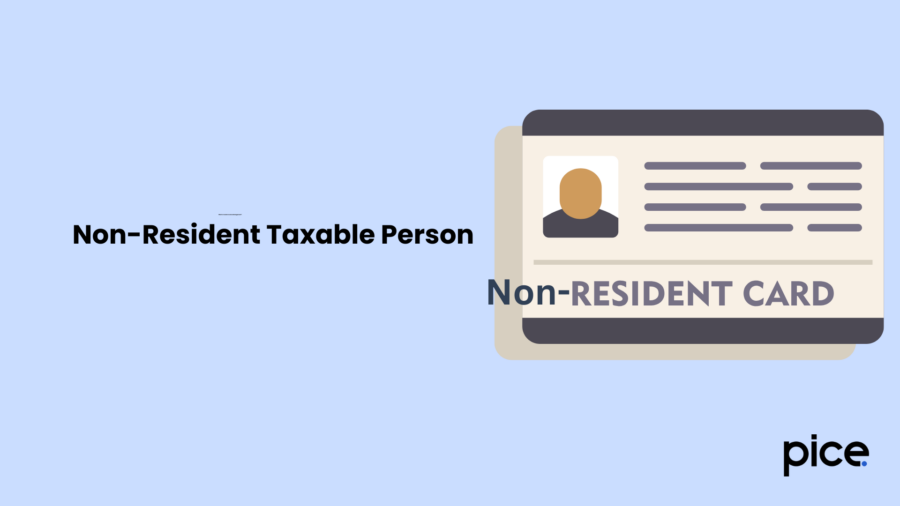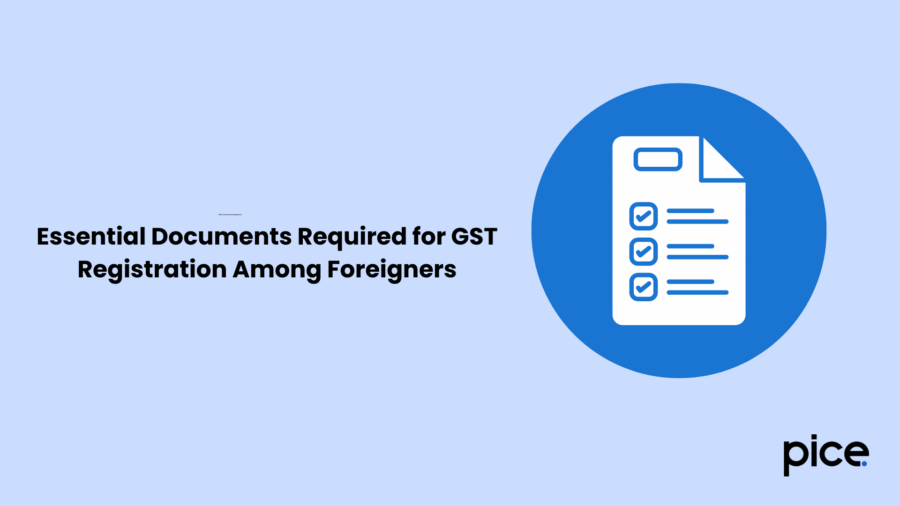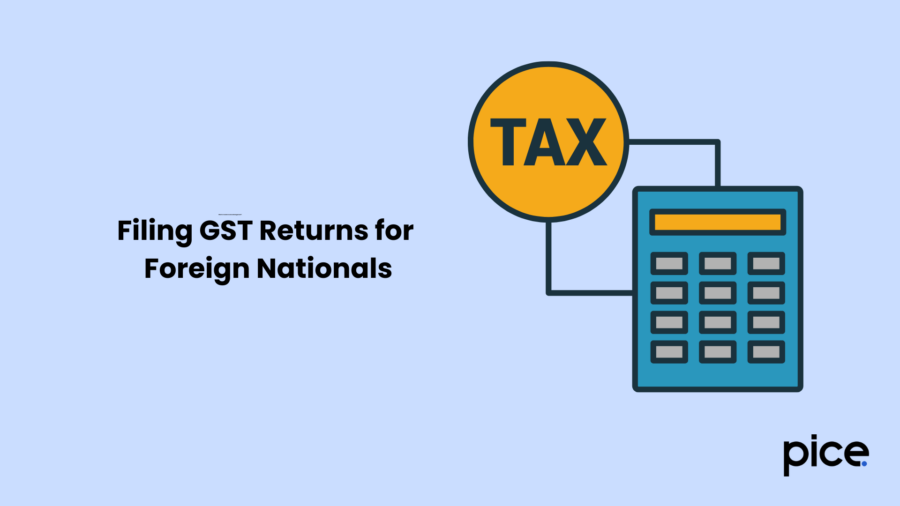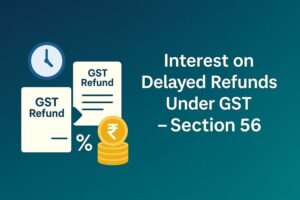The Procedure of GST Registration for NRI
- 15 May 25
- 9 mins

The Procedure of GST Registration for NRI
Key Takeaways
- GST registration is mandatory for NRIs supplying goods or services in India.
- Apply with Form GST REG-09 and pay estimated advance tax.
- Submit passport, TIN/PAN, business and bank details.
- Registration is valid for 90 days and extendable.
- File returns via GSTR-5; refunds possible after compliance.
After the introduction of the GST regime, the Government of India made it compulsory for all foreign non-resident taxpayers to register under GST if they intend to supply goods or services to customers in India. Obtaining GST registration is not just about fulfilling a legal requirement.
It also plays a vital role in building the business presence of a Non-Resident Indian in the Indian market. This blog covers everything you need to know about GST registration for NRI businesses.
Non-Resident Taxable Person

According to the Goods and Services Tax, non-resident entities occasionally conduct business involving the provision of products or services. They undertake these services as agents but have no specific location of the business entity in India.
The GST regulation mandates that these entities register themselves under GST and comply with its provisions, irrespective of the frequency or volume of their transactions in India.
GST Registration Requirements for Non-Resident Taxable Persons
Non-resident taxpayers can register for GST without any threshold limit. Below are some of the requirements that non-resident taxable persons (NRTP) need to fulfil to increase taxable transactions in India:
● The composition levy scheme under GST, which enables small taxpayers to comply and pay applicable taxes more easily, is not available to NRTPs.
● GST registration is mandatory for non-resident taxable persons irrespective of transaction volume. They do not have to maintain a minimum threshold for registration.
● As main document evidence, a non-resident taxable person must submit a valid passport for GST registration.
● They must include their Tax Identification Number (TIN) as they perform business operations outside India. They can also provide their Permanent Account Number (PAN) if they have one.
Essential Documents Required for GST Registration Among Foreigners

To complete the foreigner GST registration, the below documents including business details are essential:
● Proof of Appointment of Authorised Signatory
● Copy of Resolution passed by Board of Directors or Managing Committee
● Letter of Authorisation
● Proof of Principal Business Entity Location (all from the below list)
○ Property Tax Receipt/Electricity Bill/Legal Ownership Document for owned location
○ Lease Agreement/Annual Rent Receipt including NOC for leased or rented location
○ Consent letter and Municipal Khata Copy/Property Tax Receipt/Legal Ownership Document for shared location
● Proof of Bank Account Details:
○ The first page of your passbook
○ Bank Statement
○ Cancelled Cheque
Prerequisites that a Non-Resident Taxable Person Must Meet to Ensure GST Compliance
A Non-Resident Taxable Person must fulfil specific prerequisites to complete GST registration and ensure proper compliance and verification on the GST Portal:
● An authorised signatory must present within India with valid details.
● The authorised signatory must be reachable through a valid mobile number for smooth communications and successful verification.
● This signatory must provide a valid e-mail address to enable official notifications and electronic correspondence.
● The authorised signatory must have a valid Permanent Account Number (PAN) to uphold authenticity and traceability.
The application for registration shall be submitted along with a Tax Identification Number (TIN), Passport Number, Permanent Account Number (PAN), or any other unique identifier released by the government of their country.
● The applicant should have a specified place of business for the duration of their registration period in the state for which they are applying for registration.
Validity of NRI GST Registration
After the certificate of registration has been granted, a non-resident Taxable Person conducts taxable supplies. Unless a shorter period is specified when requesting such registration, the issued registration certificate is valid for 90 days. The concerned GST officer may further extend this by an additional 90 days.
Non-resident taxable persons should make an advance tax deposit to apply for registration. This amount is equal to the estimated tax obligation for the time frame for which registration is requested. Furthermore, an extra tax payment equal to the expected tax due for the extended period must be made if the registration certificate is extended.
What is the Process of GST Registration for NRIs?

Provisional GST Registration Process for NRI
● Using the form GST REG-09, an NRTP can apply for a GST registration online. They also have to provide a self-attested copy of his or her valid passport.
● The GST registration application has to be properly signed or EVC-verified. Additionally, it needs to be turned in at least five days before the commencement of business.
● If it is a foreign entity that is established outside India, the non-resident taxable person must apply for registration with his or her tax identification number (TIN) of that country. He or she can also submit a PAN. Based on the estimation, an advance deposit of tax should also be submitted with the GST registration application.
Final GST registration for NRI
- The individual will use the FORM GST REG-26 to electronically apply if he or she wants to register under GST.
- Any information needs to be provided within three months. This is important for validating the provisional registration.
- The final GST registration form will be given in form GST REG-06 if the information is complete and correct.
- The officer will issue a show-cause notice using the form GST REG-27 if the information is not correct. Then the applicant will receive a reasonable opportunity to be heard.
- The issued show cause notice will be nullified if the applicant’s reply is satisfactory. They will issue an order through the form GST REG-28, cancelling the provisional registration.
- If the applicant provides a satisfactory response, the show cause notice can be cancelled through an official order issued in Form GST REG-20.
- The application for GST registration must be properly signed by the authorised signatory. This signatory should be a person resident in India and must hold a valid PAN.
Extension of GST Registration Validity
There is a possibility that the NRI wants to extend his or her GST registration more than the specified period in the application or 90 days. In this instance, they must apply for an extension with form GST REG-11 before the expiry of the current registration. The NRIs have to make an extra advance payment of tax for the duration of the extension.
This procedure makes sure that NRIs are well-informed and are ready to follow all regulatory requirements for conducting taxable transactions in India under the GST regime.
Eligibility for Input Tax Credit
The non-resident taxable persons cannot claim input tax credits while receiving any goods or services. However, persons who directly import goods are exempt from this eligibility criteria. Nevertheless, the respective recipients can utilise the taxes paid by non-resident taxable persons as a credit.
Filing GST Returns for Foreign Nationals

A non-resident taxable person must file a GST return electronically using FORM GSTR-5. Filing this return contains information on inward and outward supplies. Any unpaid taxes, interest, penalties, fees or other charges under the GST Act or regulations must be paid. They must complete the payment within seven days after the end of the registration validity period or thirteen days after the end of a calendar month, whichever comes first.
GST Refund for Foreigners in India
An advance tax paid by NRTP will be eligible for a GST refund for foreigners in India. This is possible only after filing all required returns for the duration when their registration certificate is valid. NRTPs can submit their refund request in Section 13 of FORM GSTR-5.
Conclusion
If you are looking to supply goods and services in India, you must understand the procedure of GST registration for NRI. As a non-resident taxpayer, you will need to file your GST returns electronically using Form GSTR-5. However, you won’t be eligible to claim input tax credit on goods or services received.
Keep in mind the GST registration certificate is typically valid for 90 days unless a shorter period is specified. For a smooth registration experience, seeking expert assistance is always a smart move.
💡If you want to streamline your invoices and make payments via credit or debit card or UPI, consider using the PICE App. Explore the PICE App today and take your business to new heights.
 By
By 
















